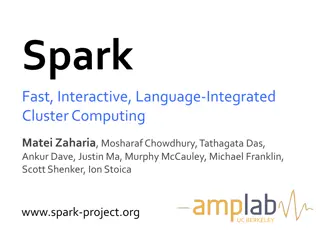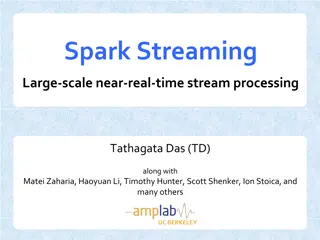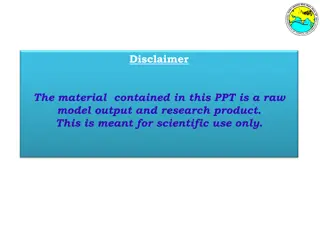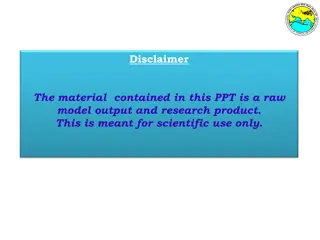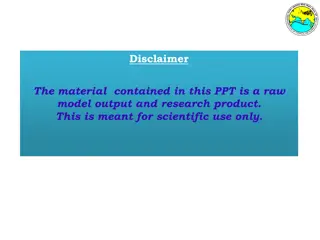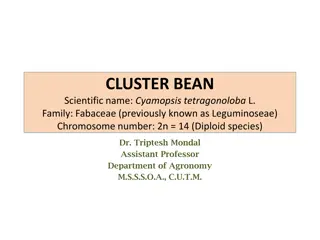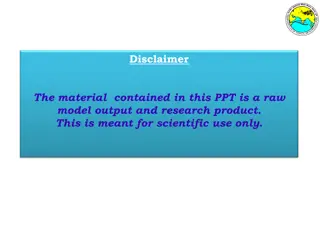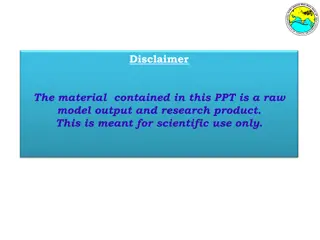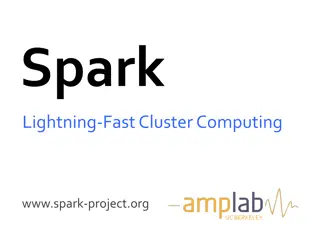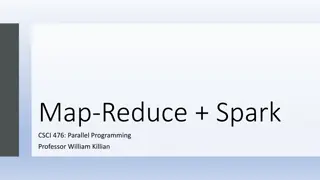Introduction to Spark: Lightning-fast Cluster Computing
Apache Spark is a fast and general-purpose cluster computing system that provides high-level APIs in Java, Scala, and Python. It supports a rich set of higher-level tools like Spark SQL for structured data processing and MLlib for machine learning. Spark was developed at UC Berkeley AMPLab in 2009 and open-sourced in 2010 to generalize MapReduce for new applications within the same engine, offering lightning-fast cluster computing capabilities.
Download Presentation

Please find below an Image/Link to download the presentation.
The content on the website is provided AS IS for your information and personal use only. It may not be sold, licensed, or shared on other websites without obtaining consent from the author. Download presentation by click this link. If you encounter any issues during the download, it is possible that the publisher has removed the file from their server.
E N D
Presentation Transcript
Intro to Spark Lightning-fast cluster computing
What is Spark? Spark Overview: A fast and general-purpose cluster computing system.
What is Spark? Spark Overview: A fast and general-purpose cluster computing system. It provides high-level APIs in Java, Scala and Python, and an optimized engine that supports general execution graphs.
What is Spark? Spark Overview: A fast and general-purpose cluster computing system. It provides high-level APIs in Java, Scala and Python, and an optimized engine that supports general execution graphs. It supports a rich set of higher-level tools including: Spark SQL for SQL and structured data processing MLlib for machine learning GraphX for graph processing Spark Streaming for streaming processing
Apache Spark A Brief History
A Brief History: MapReduce circa 2004 Google MapReduce: Simplified Data Processing on Large Clusters Jeffrey Dean and Sanjay Ghemawat research.google.com/archive/mapreduce.html research.google.com/archive/mapreduce.html MapReduce is a programming model and an associated implementation for processing and generating large data sets.
A Brief History: MapReduce circa 2004 Google MapReduce: Simplified Data Processing on Large Clusters Jeffrey Dean and Sanjay Ghemawat research.google.com/archive/mapreduce.html research.google.com/archive/mapreduce.html MapReduce is a programming model and an associated implementation for processing and generating large data sets.
A Brief History: MapReduce MapReduce use cases showed two major limitations: 1. difficultly of programming directly in MR 2. performance bottlenecks, or batch not fitting the use cases In short, MR doesn t compose well for large applications
A Brief History: Spark Developed in 2009 at UC Berkeley AMPLab, then open sourced in 2010, Spark has since become one of the largest OSS communities in big data, with over 200 contributors in 50+ organizations Unlike the various specialized systems, Spark s goal was to generalize MapReduce to support new apps within same engine Lightning-fast cluster computing
A Brief History: Special Member Lately I've been working on the Databricks Cloud and Spark. I've been responsible for the architecture, design, and implementation of many Spark components. Recently, I led an effort to scale Spark and built a system based on Spark that set a new world record for sorting 100TB of data (in 23 mins). @Reynold Xin @Reynold Xin
A Brief History: Benefits Of Spark Speed Run programs up to 100x faster than Hadoop MapReduce in memory, or 10x faster on disk.
A Brief History: Benefits Of Spark Speed Run programs up to 100x faster than Hadoop MapReduce in memory, or 10x faster on disk.
A Brief History: Benefits Of Spark Speed Run programs up to 100x faster than Hadoop MapReduce in memory, or 10x faster on disk. Ease of Use Write applications quickly in Java, Scala or Python.
A Brief History: Benefits Of Spark Speed Run programs up to 100x faster than Hadoop MapReduce in memory, or 10x faster on disk. WordCount in 3 lines of Spark Ease of Use Write applications quickly in Java, Scala or Python. WordCount in 50+ lines of Java MR
A Brief History: Benefits Of Spark Speed Run programs up to 100x faster than Hadoop MapReduce in memory, or 10x faster on disk. Ease of Use Write applications quickly in Java, Scala or Python. Generality Combine SQL, streaming, and complex analytics.
A Brief History: Benefits Of Spark Speed Run programs up to 100x faster than Hadoop MapReduce in memory, or 10x faster on disk. Ease of Use Write applications quickly in Java, Scala or Python. Generality Combine SQL, streaming, and complex analytics.
A Brief History: Key distinctions for Spark vs. MapReduce handles batch, interactive, and real-time within a single framework programming at a higher level of abstraction more general: map/reduce is just one set of supported constructs functional programming / ease of use reduction in cost to maintain large apps lower overhead for starting jobs less expensive shuffles
TL;DR: Smashing The Previous Petabyte Sort Record databricks.com/blog/2014/11/05/spark-officially-sets-a-new-record-in-large-scale-sorting.html databricks.com/blog/2014/11/05/spark-officially- sets-a-new-record-in-large-scale-sorting.html
TL;DR: Sustained Exponential Growth Spark is one of the most active Apache projects ohloh.net/orgs/apache ohloh.net/orgs/apache
TL;DR: Spark Just Passed Hadoop in Popularity on Web datanami.com/2014/11/21/spark-just-passed-hadoop-popularity-web-heres/ datanami.com/2014/11/21/spark-just-passed- hadoop-popularity-web-heres/ In October Apache Spark (blue line) passed Apache Hadoop (red line) in popularity according to Google Trends
TL;DR: Spark Expertise Tops Median Salaries within Big Data oreilly.com/data/free/2014-data-science-salary-survey.csp oreilly.com/data/free/2014-data-science- salary-survey.csp
Apache Spark Spark Deconstructed
Spark Deconstructed: Scala Crash Course Spark was originally written in Scala, which allows concise function syntax and interactive use. Before deconstruct Spark, introduce to Scala.
Scala Crash Course: About Scala High-level language for the JVM Object oriented + functional programming Statically typed Comparable in speed to Java* Type inference saves us from having to write explicit types most of the time Interoperates with Java Can use any Java class (inherit from, etc.) Can be called from Java code
Scala Crash Course: Variables and Functions Declaring variables: var x: Int = 7 var x = 7 // type inferred val y = hi // read-only
Scala Crash Course: Variables and Functions Declaring variables: Java equivalent: var x: Int = 7 int x = 7; var x = 7 // type inferred val y = hi // read-only final String y = hi ;
Scala Crash Course: Variables and Functions Declaring variables: Java equivalent: var x: Int = 7 int x = 7; var x = 7 // type inferred val y = hi // read-only final String y = hi ; Functions: def square(x: Int): Int = x*x def square(x: Int): Int = { x*x } def announce(text: String) = { println(text) }
Scala Crash Course: Variables and Functions Declaring variables: Java equivalent: var x: Int = 7 int x = 7; var x = 7 // type inferred val y = hi // read-only final String y = hi ; Functions: Java equivalent: def square(x: Int): Int = x*x int square(int x) { def square(x: Int): Int = { return x*x; x*x } } void announce(String text) { def announce(text: String) = System.out.println(text); { } println(text) }
Scala Crash Course: Scala functions (closures) (x: Int) => x + 2 // full version
Scala Crash Course: Scala functions (closures) (x: Int) => x + 2 // full version x => x + 2 // type inferred
Scala Crash Course: Scala functions (closures) (x: Int) => x + 2 // full version x => x + 2 // type inferred _ + 2 // placeholder syntax (each argument must be used exactly once)
Scala Crash Course: Scala functions (closures) (x: Int) => x + 2 // full version x => x + 2 // type inferred _ + 2 // placeholder syntax (each argument must be used exactly once) x => { // body is a block of code val numberToAdd = 2 x + numberToAdd }
Scala Crash Course: Scala functions (closures) (x: Int) => x + 2 // full version x => x + 2 // type inferred _ + 2 // placeholder syntax (each argument must be used exactly once) x => { // body is a block of code val numberToAdd = 2 x + numberToAdd } // Regular functions def addTwo(x: Int): Int = x + 2
Scala Crash Course: Collections processing Processing collections with functional programming val list = List(1, 2, 3)
Scala Crash Course: Collections processing Processing collections with functional programming val list = List(1, 2, 3) list.foreach(x => println(x)) // prints 1, 2, 3 list.foreach(println) // same
Scala Crash Course: Collections processing Processing collections with functional programming val list = List(1, 2, 3) list.foreach(x => println(x)) // prints 1, 2, 3 list.foreach(println) // same list.map(x => x + 2) // returns a new List(3, 4, 5) list.map(_ + 2) // same
Scala Crash Course: Collections processing Processing collections with functional programming val list = List(1, 2, 3) list.foreach(x => println(x)) // prints 1, 2, 3 list.foreach(println) // same list.map(x => x + 2) // returns a new List(3, 4, 5) list.map(_ + 2) // same list.filter(x => x % 2 == 1) // returns a new List(1, 3) list.filter(_ % 2 == 1) // same
Scala Crash Course: Collections processing Processing collections with functional programming val list = List(1, 2, 3) list.foreach(x => println(x)) // prints 1, 2, 3 list.foreach(println) // same list.map(x => x + 2) // returns a new List(3, 4, 5) list.map(_ + 2) // same list.filter(x => x % 2 == 1) // returns a new List(1, 3) list.filter(_ % 2 == 1) // same list.reduce((x, y) => x + y) // => 6 list.reduce(_ + _) // same
Scala Crash Course: Collections processing Functional methods on collections http://www.scala-lang.org/api/2.10.4/index.html#scala.collection.Seq http://www.scala-lang.org/api/2.10.4/index.html#scala.collection.Seq Method on Seq[T] map(f: T => U): Seq[U] flatMap(f: T => Seq[U]): Seq[U] filter(f: T => Boolean): Seq[T] exists(f: T => Boolean): Boolean forall(f: T => Boolean): Boolean reduce(f: (T, T) => T): T groupBy(f: T => K): Map[K, List[T]] sortBy(f: T => K): Seq[T] Explanation Each element is result of f One to many map Keep elements passing f True if one element passes f True if all elements pass Merge elements using f Group elements by f Sort elements ..
Spark Deconstructed: Log Mining Example // load error messages from a log into memory // then interactively search for various patterns // https://gist.github.com/ceteri/8ae5b9509a08c08a1132 // https://gist.github.com/ceteri/8ae5b9509a08c08a1132 // base RDD val file = sc.textFile("hdfs://...") // transformed RDDs val errors = file.filter(line => line.contains("ERROR")) errors.cache() errors.count() // action errors.filter(_.contains("mysql")).count() // action errors.filter(_.contains("php")).count()
Spark Deconstructed: Log Mining Example // base RDD val file = sc.textFile("hdfs://...") // transformed RDDs val errors = file.filter(line => line.contains("ERROR")) errors.cache() errors.count() // action errors.filter(_.contains("mysql")).count() discussing the other part // action errors.filter(_.contains("php")).count()
Spark Deconstructed: Log Mining Example At this point, take a look at the transformed RDD operator graph: scala> errors.toDebugString res1: String = (2) FilteredRDD[2] at filter at <console>:14 | log.txt MappedRDD[1] at textFile at <console>:12 | log.txt HadoopRDD[0] at textFile at <console>:12
Spark Deconstructed: Log Mining Example // base RDD val file = sc.textFile("hdfs://...") // transformed RDDs val errors = file.filter(line => line.contains("ERROR")) errors.cache() Worker errors.count() block 1 // action errors.filter(_.contains("mysql")).count() Worker Driver // action discussing the other part block 2 errors.filter(_.contains("php")).count() Worker block 3
Spark Deconstructed: Log Mining Example // base RDD val file = sc.textFile("hdfs://...") // transformed RDDs val errors = file.filter(line => line.contains("ERROR")) errors.cache() Worker errors.count() block 1 // action errors.filter(_.contains("mysql")).count() Worker Driver // action discussing the other part block 2 errors.filter(_.contains("php")).count() Worker block 3
Spark Deconstructed: Log Mining Example // base RDD val file = sc.textFile("hdfs://...") // transformed RDDs val errors = file.filter(line => line.contains("ERROR")) errors.cache() Worker read HDFS block errors.count() block 1 // action errors.filter(_.contains("mysql")).count() Worker Driver read HDFS block // action discussing the other part block 2 errors.filter(_.contains("php")).count() Worker read HDFS block block 3
Spark Deconstructed: Log Mining Example // base RDD val file = sc.textFile("hdfs://...") // transformed RDDs cache 1 val errors = file.filter(line => line.contains("ERROR")) process, cache data errors.cache() Worker errors.count() block 1 // action cache 2 process, cache data errors.filter(_.contains("mysql")).count() Worker Driver // action discussing the other part block 2 errors.filter(_.contains("php")).count() cache 3 process, cache data Worker block 3
Spark Deconstructed: Log Mining Example // base RDD val file = sc.textFile("hdfs://...") // transformed RDDs cache 1 val errors = file.filter(line => line.contains("ERROR")) errors.cache() Worker errors.count() block 1 // action cache 2 errors.filter(_.contains("mysql")).count() Worker Driver // action discussing the other part block 2 errors.filter(_.contains("php")).count() cache 3 Worker block 3
Spark Deconstructed: Log Mining Example // base RDD val file = sc.textFile("hdfs://...") // transformed RDDs discussing the other part cache 1 val errors = file.filter(line => line.contains("ERROR")) errors.cache() Worker errors.count() block 1 // action cache 2 errors.filter(_.contains("mysql")).count() Worker Driver // action block 2 errors.filter(_.contains("php")).count() cache 3 Worker block 3
Spark Deconstructed: Log Mining Example // base RDD val file = sc.textFile("hdfs://...") // transformed RDDs discussing the other part cache 1 val errors = file.filter(line => line.contains("ERROR")) process from cache errors.cache() Worker errors.count() block 1 // action cache 2 process from cache errors.filter(_.contains("mysql")).count() Worker Driver // action block 2 errors.filter(_.contains("php")).count() cache 3 process from cache Worker block 3
Spark Deconstructed: Log Mining Example // base RDD val file = sc.textFile("hdfs://...") // transformed RDDs discussing the other part cache 1 val errors = file.filter(line => line.contains("ERROR")) errors.cache() Worker errors.count() block 1 // action cache 2 errors.filter(_.contains("mysql")).count() Worker Driver // action block 2 errors.filter(_.contains("php")).count() cache 3 Worker block 3







